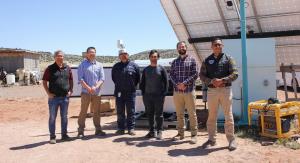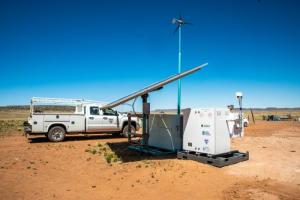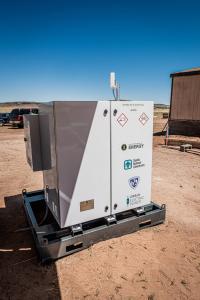Urban Electric Power’s rechargeable alkalines offer non-toxic energy equity to Navajo Nation and families off-the-grid

Deployment team (left to right ): Stan Atcitty (Sandia), Henry Guan (Sandia), Alexis Brown (Navajo Tribal Utility Authority), Umer Anwer (Urban Electric Power), David Rosewater (Sandia), Derrick Terry (Navajo Tribal Utility Authority) Credit: Stan Atcitty, Sandia
Long-life, maintenance-free batteries supply a remote home with electric power for several days between recharges from solar panels
Urban Electric Power replaced lead-acid batteries formerly used at this Navajo home as part of a demonstration project of its rechargeable alkalines for Sandia National Laboratories’ Energy Storage Demonstration Projects team, and the Department of Energy’s Office of Electricity Energy Storage Program. The new installation stores enough electricity from a solar array to power the home for several days between recharges, offering a safer, more environmentally friendly, cost-effective alternative to either lead or lithium batteries.
Critically, these alkaline batteries don’t require regularly refilling an electrolyte as flooded lead-acid batteries do, which can be costly and inconvenient in such a remote location. They have been demonstrated to last up to eight years with minimal capacity fade, unlike other batteries advertised as "no-maintenance" which tend to die quickly — often within a year or two in these applications.
“We can provide long life with no maintenance, as shown by the IEC Solar Protocol testing,” said Gabriel Cowles, Urban Electric Power’s VP of Commercial Strategy and Finance. “It’s the best of both worlds.” In addition, the standard zinc-manganese dioxide chemistry of these alkaline batteries is certified3 to pose no risk of “thermal runaway,” or hot, hard-to-extinguish fires, a problem that can face lithium batteries.
More than 15,000 residents live without grid-supplied electricity on the Navajo Nation, which spans 17.5 million acres across parts of Arizona, New Mexico and Utah. To address their needs, the Navajo Tribal Utility Authority has installed 500 solar PV and energy storage systems of various kinds to date.
Derrick Terry, Renewable Energy Specialist for the Authority and a member of the Navajo Nation, told Sandia1 that the Authority “takes a three-pronged approach to deploying these systems — safety, reliability, and efficiency.” He said a 30-year partnership with Sandia “has helped us with the latest knowledge and technical advisement, so that we can deliver these systems to our remote families.”
Working with the Authority, Urban Electric Power set out to make off-grid living safer and easier so that residents can continue to live where they choose without the fear of being caught without power. The home chosen for the first demonstration system can use its PV solar system when the sun is shining and the charged battery when it’s not — even when temperatures spike well over 100° Fahrenheit, since Urban Electric Power’s non-lithium batteries have been tested to operate at more than 122° Fahrenheit (50° Celsius).
Urban Electric Power has given new life to the century-old technology of familiar household AA alkaline batteries with a patented method of making them rechargeable for 10 years or more. That’s 50 times longer than when Ford Motors2 first tried recharging alkalines. They cost about half of what lithium batteries cost for comparable capacity. “Our rechargeable alkaline batteries expand energy equity by bringing off-grid power to homes that would not otherwise have electricity, and doing it safely, reliably, and affordably,” said Cowles.
The technical details: Patented additives in Urban Electric Power’s cells allow for “facile proton intercalation and de-intercalation processes” to take place in the manganese dioxide cathode without leading to its crystal structure breakdown; that solves one of the main problems of current battery technology. Zinc self-discharge is also curtailed, allowing for greater reversibility and long-term use, and making their batteries ideal for microgrid applications. The materials used can easily be sourced from the existing $13 billion supply chain for alkaline batteries, increasing American energy security.
According to Dr. Imre Gyuk, who directs the DOE Energy Storage Program, “Tribal projects are not only an obligation for DOE, but they provide valuable experience for off-grid applications in the U.S. and abroad.” Two more demonstration projects at Navajo homes are moving ahead with Urban Electric Power batteries.
Urban Electric power has products for home, commercial, and grid-scale use, manufactured in Pearl River, New York. They all use no lead, a notorious environmental hazard that according to UNICEF exposes one in three children worldwide to lead poisoning, and no cobalt or cadmium, also toxic and challenging to source. This is especially important to the Navajo, who have had to deal with mining contamination and other toxic exposures in the past.
Allison Lenthall
RenewComm
+1 202-322-8285
email us here
Visit us on social media:
Twitter
LinkedIn
1 https://energy.sandia.gov/deployment-of-uep-battery-energy-storage-system-on-the-navajo-nation/
2 https://www.nature.com/articles/s41928-018-0048-6
3 https://urbanelectricpower.com/2021/09/20/urban-electric-power-batteries-achieve-key-fire-safety-certification/


